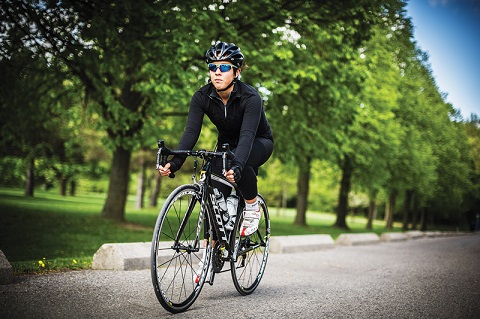I’m an endurance athlete with epilepsy, We exist! When I was diagnosed with epilepsy in 2007, I did my absolute best to keep participating in the sports I love. I have complex partial seizures and take medications to control them. My days require so much effort on many levels.
People are curious when they find out I’m training and competing. They ask, “Aren’t you afraid of having a seizure while you’re out there?” I’m aware, but not afraid, of the possibility that I could have a seizure when I’m pushing my body like this. In no part of our life can we completely eliminate risk. The best we can do is figure out how to minimize it, so, I have had to learn to ask for help. It’s important to have people who know me well stationed throughout the course. They can recognize the difference between what I look like when I’m working hard and what I look like when I need assistance.
In October 2014, I was competing in the Toronto Waterfront Marathon. Around 30 kilometres into the 42-kilometre event, I had an aura and I knew I was going to have a seizure. Thanks to excellent planning and my amazing family, I was able to safely have the seizure. I did not finish that race but I have learned from it, to give my family, friends and doctors the right to decide whether or not it is safe for me to compete. Sometimes we get so ambitious with our athletic goals and we ask so much of ourselves that we forget to slow down and give our bodies the kindness they deserve.
The main side effects of my seizure medications are fatigue and lethargy. Every time I am able to get myself out the door to train or compete is a podium achievement. It takes special attention for me to figure out if I am feeling normal medication-related fatigue or training-related fatigue. I have to skip the workout if it’s the latter because it could increase my risk of a seizure. It is such a fine balance.

Last summer, I competed in my first half Ironman triathlon. It was only my third triathlon since being diagnosed with epilepsy. I wanted to be as safe as possible and make the event as fun as possible, so I got in touch with the race organizers to make them aware of my medical condition. They checked in with me throughout the course.
For the swim, I got advice on where to start, and I made sure to keep a kayak in sight at all times. I stayed on the inside of the swim course so that I could get out of the crowd of swimmers and float on my back if I felt at all as if I was going to have a seizure. All seemed to go well until, five kilometres into the bike course, I realized that I had forgotten my seizure medications and my energy gels in the transition zone. I considered turning around and going back, but I opted not to – a risk I should not have taken.
I made it safely through the bike course and took my medications in the transition zone between the bike and the run. The transition zone is a curious place. Transitioning in triathlon is often a sport of “How fast can I get in and out of here without forgetting anything?” I have found that the transition zone needs to be a time to slow down and listen to what my body needs, just like in the rest of life. I needed to sit, take my medications and ask myself “Am I OK?” I was foggy for the first kilometres of the run because of the seizure medications. “Am I OK?” I kept asking myself as the kilometre markers went by. The answer was “yes?” I placed fourth in my age
I will never race hard enough that I will cross the finish line and collapse, but I will race hard enough to achieve my goals. Through writing about my experiences, I’m working to raise awareness. Together, my support network and I can achieve great things on behalf of athletes with epilepsy.
Glenna Fraumeni (BSc 2008 St. Michael’s) is an endurance athlete and registered nurse who provides holistic care to people living with HIV/AIDS in Toronto. This article originally appeared in the The Huffington Post.
Recent Posts
U of T’s Feminist Sports Club Is Here to Bend the Rules
The group invites non-athletes to try their hand at games like dodgeball and basketball in a fun – and distinctly supportive – atmosphere
From Mental Health Studies to Michelin Guide
U of T Scarborough alum Ambica Jain’s unexpected path to restaurant success
A Blueprint for Global Prosperity
Researchers across U of T are banding together to help the United Nations meet its 17 sustainable development goals






2 Responses to “ Personal Best ”
Glenna is simply the most courageous and inspiring person I've had the privilege to know. She is determined to bring dignity and compassionate nursing care to the most marginalized and underserved populations. She is wise, kind, visionary, and fun too! Thank you for featuring this outstanding alumna.
Thanks for the article. It's helped me decide to build up to an Ironman.